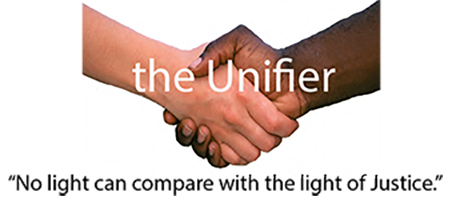Last month I announced a new feature on the Unifier. Beginning with this post I hope to present monthly book reviews, beginning with the few books that I offer on the Shopping side of this blog site. From there we can branch out to other titles dealing with the categories that I feature on the site – Race/Racism, One Human Family, Gender Inequality, Justice, Peace and the Bahá’í Faith (particularly as a model for transition.

For the first of these book reviews I have chosen a book by Tod Ewing titled “Heaven in the Face of Black Men.” Tod is a Bahá’í by Faith and an educator by profession. He is a highly accomplished workshop educator, with over twenty-five years’ experience, specializing in Race Relations. As he states in the book, “I conduct race relations/diversity training and consultation.” This focus is a natural byproduct of what he says is “wakin up Black in America.”
Before I proceed allow me to say that “Seeing Heaven in the Face of Black Men” is a delightful, easy read.” As an author myself, I define an “easy read” as a book that is well written and has an easy “flow” to it. My assessment is that it is also engaging, humorous, insightful and revealing.
Part autobiographical and part commentary on the state of race relations Ewing is amazingly candid about his experiences, particularly those taking place during the difficult years of his childhood and adolescence, never shying away from raw emotions, disappointments, anger and confusion. I was also struck by his deprecating humor. He writes, “I’m telling anyone that will listen it’s a TRIP wakin up Black in America, and it was a TRIP wakin up Colored, Negro, Afro-American, African-American, A person of Color, and of African Descent as well.” “The abbreviation would be something like CNBAAPA (Colored, Negro, Black, Afro-American, African-American, Person of Color, or of African descent)
I think Tod uses the word, “TRIP” as a way of drawing attention to the effort and worry of what to call _________ people. Its such an odd effort, one that we don’t see with White people. If it were, we would have raging debate over calling Whites – Whites, European Americans, Euro-Americans, Pale People, Beige People, etc. The fact that our society doesn’t put forth this effort indicates that it isn’t important to White people. So why is it important to belabor what we call Black people? At least that’s what I think Tod is saying. I also think he’s saying that all that effort to name and rename him demeans him in a way.
Tod believes that the act of seeing Heaven in the face of Black men is a game changer, a “profound milestone in the country’s journey toward racial unity and justice.” I particularly like Tod’s definition of heaven as Dignity, Honor, Strength and Beauty. It is a far cry from what many people see in the face of Black men today. So many White people fear Black men. When they look into the eyes of a Black man they see a man that is dangerous and harmful to them. This impression of Black men is an idea that has been cultured over the past 400+ years. The truth is the face of a Black man should elicit the same emotions as looking at the face of any man or any woman. Every man and woman was created by God to have the same positive, holy virtues as any other, and all the weaknesses of character that plague us all. Tod seems to understand this. But not only does he understand the dynamics at play, he realizes that there must be a follow through of action.
He states, “I want White folk to examine their images of Black folk, to adopt the “heaven” image as their basis for viewing black men and then do their part to facilitate the atmosphere and conditions necessary to establish unity and justice, thus helping to make this vision a reality.” (pgs. 23-24)
The action is to “do their part to facilitate…unity and justice.” Us White people created this mess, and though both Black and White have played a part of keeping it going and making it worst, we can’t sit back and think that it’s the other side that has to do all the work. Blacks don’t need to please our sensitivities. We, both Black and White, need to learn to trust one another and work together to resolve our differences.
The key to working together, according to Tod, is to begin with understanding, an understanding that is lacking. He writes, “I’m thinkin and feeling this morning, White folk and Negro folk really don’t understand each other in a deep way. We just like to pretend we do but we really don’t. So much bad blood’s passed between us that we see each other through dirty lenses and keep our distance.”
I have a friend who liked to say that we won’t get to know one another sitting in the living room. It was only when we sat together at the kitchen table that we would begin that understanding. Tod continues by saying, “It’s a natural fact however, the minority generally knows that majority, better than the other way around. Minority has to study the majority or those in power to figure out how to make it in their world. Women study men the same way and employees study the boss. It’s really about survival. But even if Colored folk know Caucasian folk better than the other way around, we still don’t know them very well. General knowledge is not good enough to solve our problems. We need to take a closer look because it may sometimes feel like nothing has changed and therefore it’s not worth lookin. I think some things have. Some things are still pretty messed up between the races and I’ll get to that, but one thing I have noticed in my travels is, more White folk are more casually and naturally friendly to me than in years past.” (p. 32)
People use the term “Institutional” or “Institutionalized Racism.” What does that mean? If I understand it correctly, and I think I do, though I’m always open to new information, it means a level of racism that permeates institutions such as Fortune 500 companies, police forces, Service workers such as road construction or parks. It means that White leadership controls the decisions of operation and human resources, etc. It can be a conscious and directed, or it can be unconscious or unaware racism.
Tod gives a good example of “unawares racism” one that I didn’t realize until I read his book. He writes,
“Sportscasters always talk about the ‘athleticism’ of Black folk when they talk about how we play and very rarely about how we use our heads or think when we play. Not the same way they talk about great White athletes. Always talk about how these White players are thinkin or out-thinkin other players, using their minds to play the game. I noticed that big time with Serena and Venus. Their athleticism, power and speed are extolled, but almost no reference to how smart they play. It was worse when they first started, but even now, alter all they have accomplished, very rarely do sportscasters talk about how smart they must be. Let me tell you all something: you can’t win as much as they have won without havin a whole lot of brain power. That kind of condescension stuff gets real old and is just plain insulting.”
I believe that there is much more that I could say about Tod Ewing and Seeing Heaven in the Face of Black Men, but I’ll end with one last thought from Tod, and then you’ll just have to read it for yourself.
Regarding the overwhelming challenge of this work Tod writes, “Being truly honest, I mean real honest, I sometimes want to make it all about White folk fixin this thing cuz I’d rather sit back and say ‘you started this mess, you end it.’ That’s my ego, my side that’s tired out – it grabs me sometimes and doesn’t want to let go. My spiritual side tells me it is not about who got it wrong the first time(s) around but rather whose gonna get it right this time around.”


